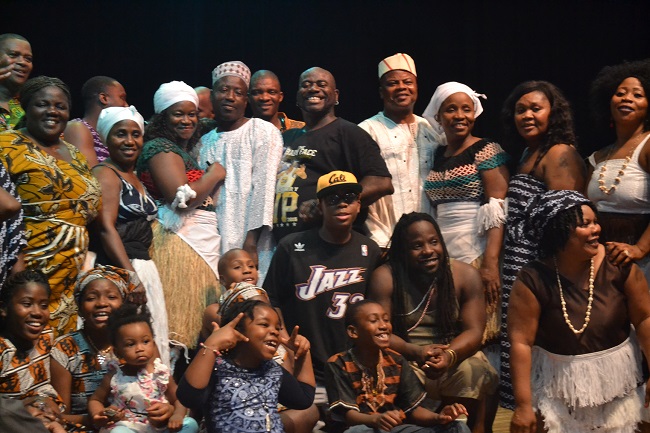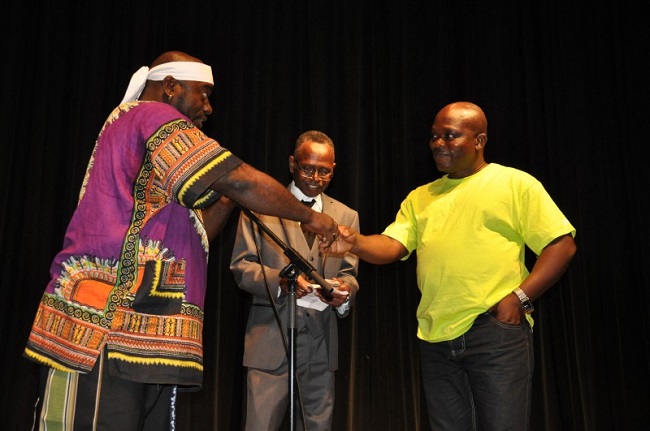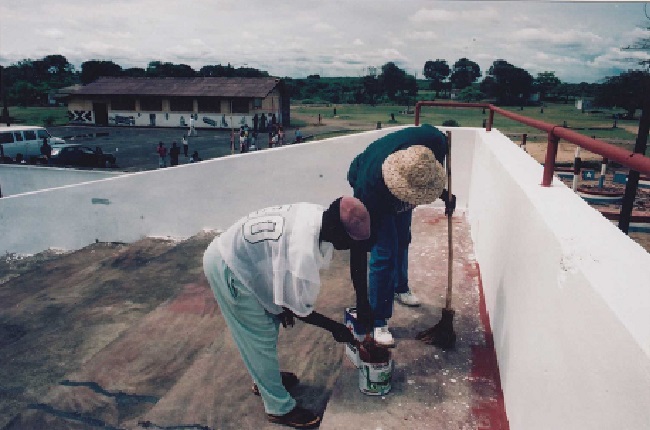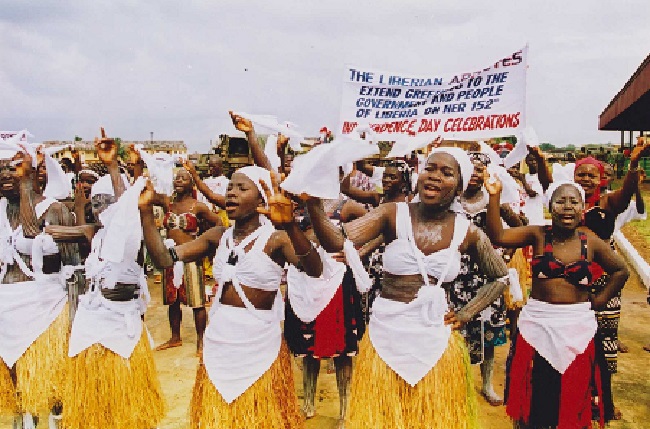Liberia: Staying true to the culture spirit

Tradition allows for group members to take photograph at the end of every show. Deputy Minister Tehmeh wasn’t available for this picture. Photo Mozart Dennis
When a visiting culture minister from the West African country of Liberia recently tried to defend his government’s controversial sale of the Kendeja national cultural shrine during a cultural event in Minnesota, many in the audience scorned and booed him for his apparent lack of “culture sensitivity” and also for trying to take his “government’s propaganda” as far as the United States; writes James kokulo Fasuekoi.
Spectators didn’t stop there-they crowned it all with demands that assistant MICAT minister Andrew Tehmeh should excuse the stage immediately so the show could go on. That’s because, many view the government’s sale of the cultural shrine as an affront to the survival of the country’s rich cultural life.
Tehmeh was in Minnesota briefly during the week of August 15, when the Liberian National Cultural Ambassadors (LNCA) of the US hosted its annual festival at the Concordia College, Roseville, Minnesota. He had joined a friend to go and watch the cultural festival and in the process the group’s officials decided, out of respect and courtesy, to recognize and announce his presence, being a culture official from the homeland.
Earlier, Tehmeh was greeted by spectators in a more dignified manner amid warm applauses as he walked up the stage to make remarks. But instead of behaving like a diplomat by acknowledging the fine cultural ties between both Liberia and the US, plus tremendous efforts by Liberian-US based cultural groups like the LNCA to bridge culture gaps between the two nations, Tehmeh bolted straight into defending the GOL’s givea way of the shrine to a foreign businessman.
“The cultural center was not sold to Bob Johnson…its space was given up to Bob Johnson, and it [cultural center] was relocated to Ben’s [Boy’s] Town on Marshall Highway,” Tehmeh, maintained, moments after the MC, Jallah Kromah handed him the microphone. He was reacting to an earlier statement by LNCA’s artistic director, Francis Nimely Vinney Napla who said the GOL sold Kendeja to Bob Johnson, adding, “We have no National Troupe right now; everything died.”
Kendeja Culture Center was established in the early 1960s through the efforts of some of the country’s outstanding indigenous sons and daughters who felt it was necessary to nurture young people’s talent and showcase Liberia’s rich cultural heritage through performing arts. It remained home to the Liberian National Cultural Troupe (LNCT) till 2008 when the RLJ & Companies demolished the shrine to build a hotel resort there.
The sale eventually led to the subsequent eviction of remnants of the National Troupe, thereby causing the dissolution of the group itself. Kendeja and the National Dance Troupe had survived for over 60 years under past administrations. The group was well respected at home and abroad. Over the years, it helped build a positive national culture conscience and attitudes among Liberians. The troupe also served as a national pride and did bring home countless trophies won from festivals staged abroad.

Francis Nimely Vinney Napla (l), Artistic Director, Liberian National Cultural Ambassadors, greets Andrew Tehmeh (r), Deputy culture minister. Jallah Koromah (c). Photo: Issa Mansaray/The AfricaPaper
To avoid a public backlash the main dealer, Pres. Ellen Sirleaf promised to relocate the group to a place called Boy’s Town, near the Camp Shefflin Military Barracks. But so far there’s no evidence that such thing will ever happen. In fact, the status of the Kendeja Land “contract” between the “RLJ & Companies” owned by US billionaire Robert Johnson and the Government of Liberia isn’t really clear. And even nearly eight years since the hasty controversial deal the GOL is yet to provide details of the agreement to allay public suspicion that funding from the deal would go into private pockets rather than benefit the public.
Notwithstanding, the MICAT which serves as the GOL mouthpiece managed to somehow provide the general public with the following “explanations” regarding the contract status through media relations. That the “RLJ & Companies” owner of Kendeja Hotel Resort will pay an annual fees of “$800.000 USD to the government of Liberia” for a period of 50 years, beginning the year 2008. That means the first contract is expected to end 2057, with a possibility for renewal just like the case with Liberia and the Firestone Rubber Plantation Company in Margibi.

Former Taylor’s Information Minister Joe Wolobah Mulbah and an assistant help with Kendeja’s renovation exercise in 1996-97. In the picture is the center’s mini stadium plus the arts building in background. Photo James Fasuekoi
Personally, it’s not so much for Tehmeh’s attempt to defend an anti-culture regime so desperate for “cash” as cited by its leaders during the Kendeja land negotiation that had me annoyed the night of the cultural festival. For after all, the deputy minister was simply trying to do the job the GOL hired him to do; that is to defend even if the matter proves impossible to defend. An example is the illegal sale of the national cultural shrine for no clear reason other than excessive greed for money and Pres. Sirleaf’s apparent dislike and misconception about certain local cultural practices.
What actually got me perplexed instead, is the fact that a Liberian cultural dignitary could go to such an important national cultural event (in a far away country), wearing a “dark jeans with a lime-green T-shirt” as if the occasion was just another summer barbeque in Brooklyn Park, Minnesota or elsewhere. Tehmeh’s attitude proved awful and was considered a national disgrace to the homeland, Liberia, especially in the eyes of many Liberians and none Liberian spectators.
A young man from the African immigrant Minnesota community described Tehmeh’s outfit as “inappropriate” and said it didn’t give Tehmeh a good portrayal as culture minister. He didn’t want to be named by this writer.
Honestly, in all of my 29 years working as journalist (photographer, political and culture writer), I’ve never seen a national culture figure from any of the countries of Africa and beyond walked in Tehmeh’s shoes, for example by attending a national cultural festival in a place such as the United States in outfits that resemble those worn by people heading to the cinema or a barbeque party. Of course, under no condition that one will ever see a Senegalese, Guinean, Nigerian, Ghanaian, Sierra Leonean or a Malian culture official grace similar event with a “Tehmeh” outlook whether in his community at home or abroad.
If one were to witness similar occasion from any of the above named countries, I am sure the culture official that would grace the program wouldn’t need much introduction either beyond what his or her attire would provide. For culture as a whole is normally treated in other African countries with a sense of national pride that is very essential to the survival of people in those places.
As proof for such cultural beliefs, historic photographs taken from worldwide cultural festivals show foreign culture officials neatly dressed in Senegalese-Malian styled garments posing with members of the LNCT. And nowhere in the world have I seen officials other than some from Liberia, sporting outfits that were inconsistent with cultural spirit especially during a festival.

Remnants of Liberian National Cultural Troupe performed at a July 26th Independence Day ceremony in 1997. Photo James Fasuekoi
But again, what else can one say concerning the “Tehmeh attitude” except to admit openly that his behavior is quite unique to Liberia, the only nation on a Black Continent still struggling with “identity crisis” in the year 2015, a cultural mishap that can clearly be traced to outside “cultural influence” or be attributed to the coming of freed Black former US Slaves to the land that would later become known as “Liberia.” Perhaps, Liberia is the only place on earth where “Natives” or some Liberians prefer to dress, speak and act like “Westerners” rather than carve their own national identity.
Frankly speaking, who, on the other hand, dares blame Tehmeh for his inability to live up to the spirit that goes with being a national culture figure in a place such as Liberia? For after all, is it not the current Sirleaf regime that has declared war against national cultural heritage in such unbefitting fashion never before witnessed in Liberia rather than wage war on corruption? In the first place who sold Kendeja shrine and caused the dissolution of the LNCT because of need for “desperate cash” and also used “illegal encroachment” (allegedly by locals) as excuse to pawn a national shrine if not the same Sirleaf government?
Besides, is it not the Pres. Sirleaf who few years back personally undertook a national campaign not only aim to shut down but to also smear the image of an honored institution, the century-old Sande College of Liberia known for molding a large segment of Liberian women into becoming wonderful housewives and outstanding national leaders? Yet after doing all these, plus many more, isn’t it an irony that the same Pres. Sirleaf would come out with the so-called “Wear Your Pride” campaign that “requires all government employees to wear, at least once a week preferably Friday, clothing made in Liberia from Liberian products” under “Liberianization” program?
So on what grounds in fact can anyone even blame a “Tehmeh” or say, hold him accountable for his recent poor cultural appearance at the LNCA-Minnesota cultural festival which claimed some attention within culture circles when head of state Ellen Sirleaf herself goes on committing cultural blunders every now and then with no clear national cultural objectives in place up to the point of this writing?
There’s certainly no ground indeed! But for God’s sake, and for the sake of tradition and promoting Liberia’s good image let Andrew Tehmeh do himself and Liberia a simple favor the next time he travels abroad-he should make sure to take along a modest Liberian type “Vai shirt” that he could wear to save his country of shame in case he comes across similar important cultural event like the one held in Roseville, Minn.
Note: James Kokulo Fasuekoi is Associate Editor for the continental Africa news magazine, The Africa Paper, based in Minneapolis, Minnesota. He covered the civil wars in Liberia and Sierra Leone during the 90s for several local dailies and international media. Contact him at: boiyeadu1@hotmail.com.

